The Beauty and Madness of Bangkok
Observations from seven days in Thailand’s Capital
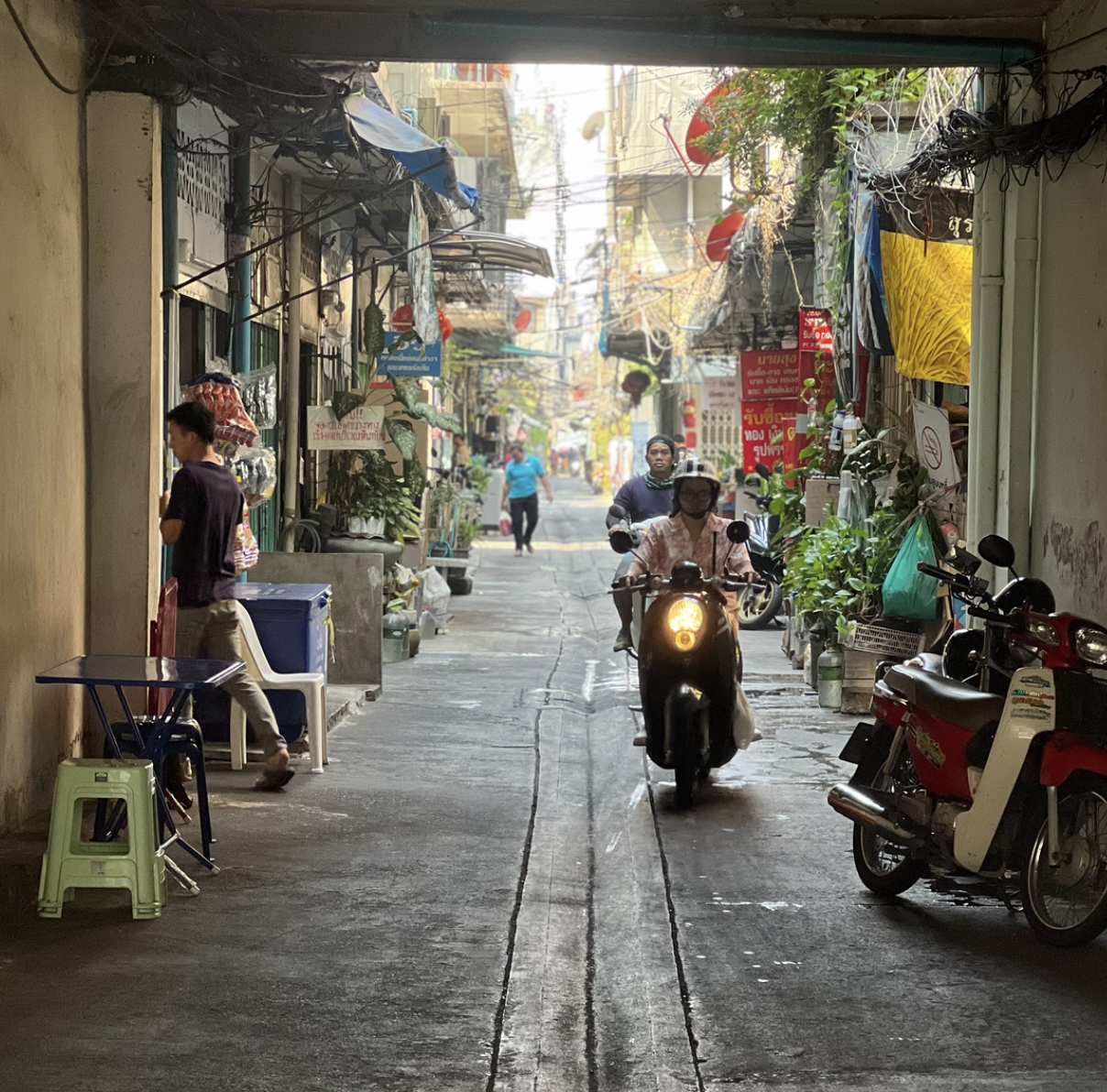
Bangkok is a broken mess. The whole city smells like a sewer. Incense burns around the clock to mask the smell of hot cement awash in piss and cigarettes and discarded trash. The infrastructure was built for a time and place years before, and perhaps after, but not today. A thin railing runs along the maze of ascending escalators to the light rail. One misstep and there would be no coming back. So many people—milling, running, smoking, yapping, sleeping, eating, selling, and moving. Nothing works as it should here. Everything is being built and rebuilt, in every direction, at all hours of the day and night. If you don’t hold on for dear life, the whole place is likely to bowl you over.
But at least Bangkok is alive.
My sister and her husband have lived in Singapore for several years now, but this is my first time in the Orient. I booked the journey during Lunar New Year and the pair, off from work, suggested a trip north to see “the real Asia.” Here in Thailand, I get my first glimpse of what that looks like.
On a Wednesday night, the train to Ari station is packed to the brim, even at midnight. Masks are ubiquitous, a necessity in a city where the pollution is so thick that the trains run for free during my week-long stay. In any other city, this would be an hour of retreat, but in Bangkok, the night is just beginning. There’s an unsettling but invigorating sense that no one here has anything to wake up for in the morning—a perpetual present. The train sways, and the undulating crowd ebbs with it. A synchronized dance of survival. My sister laughs. I’m ready to vomit. She’s seen it all before—Kuala Lumpur, Nairobi, Ho Chi Minh City, Beijing. Her husband, a history professor from Finland, opted to stay in for the night. “There are cities, and then there’s Bangkok,” he had confided in me as I struggled to gain my balance on the taxi in from the airport. How right he was.
Speaking of airports—there are signs in the stalls that teach men how to pee straight. And yet in every toilet I encounter in Thailand, the ground is covered in urine. Bangkok is a city of lament and soot—muck-filled rivers, shanty huts, dilapidated signs, weary women, and alleyways that twist and turn until you’re lost and found again. All of it has me pining for the shores of my own country, across all the oceans, where (most) men still pee straight, and (most) roads are paved smooth, and (most) places smell of cedar and alfalfa and BBQ and freedom.
My sister and I agree on one thing during our trip: in Thailand, ditch Google Maps. For food, follow the locals. If the tables are full, the food is good. It’s that simple. We find a nameless eatery up a darkened alleyway and order stir-fried beef, mixed greens, and two large Singha beers. The meal costs less than 1,000 Thai Baht ($20 USD), and it’s so good we go back for seconds. Singha, I come to learn, is one thing the Thais do exceptionally well. Later, we stumble upon a karaoke bar blasting Lana Del Rey in the Phaya Thai district.
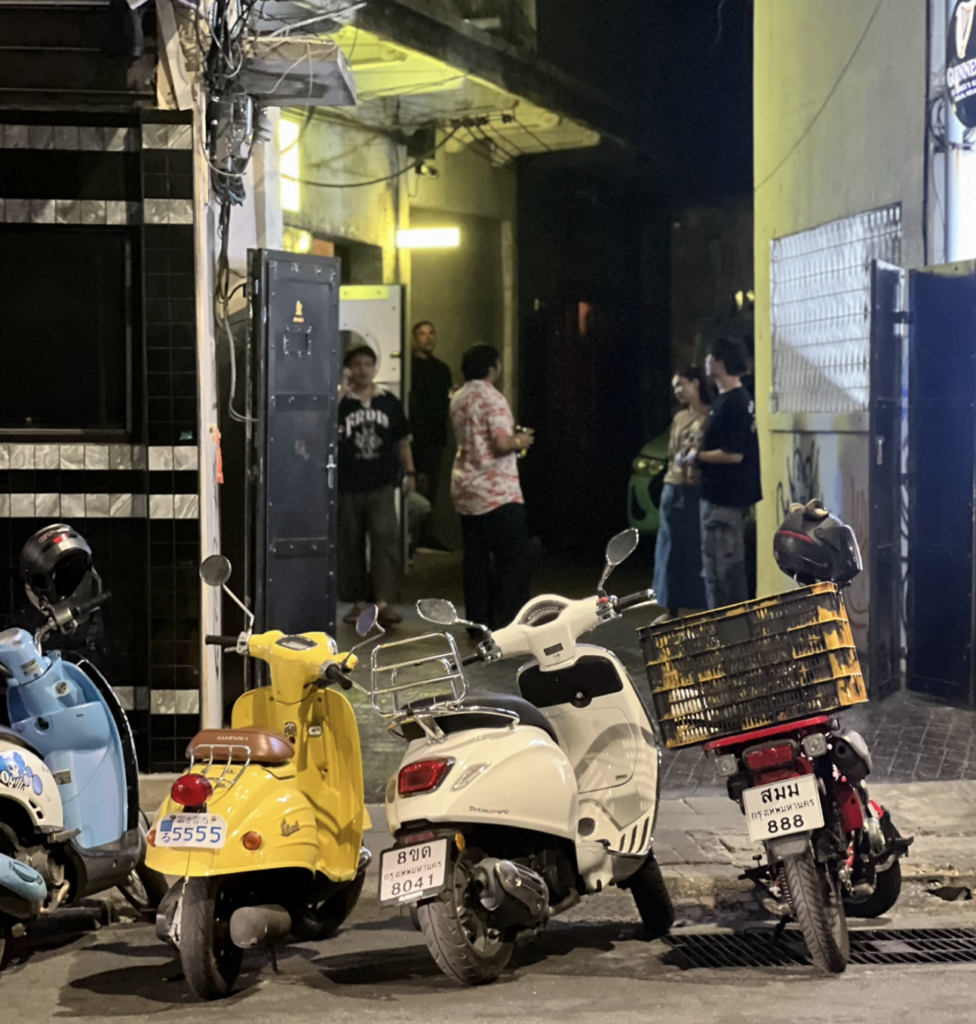
I wish I knew my sister better. She is eight years my junior; I was already well on my way to college in the Southwest by the time she was entering middle school in our hometown outside Richmond, Virginia. The 2,000 miles of separation didn’t help bring us any closer. I leapt straight into graduate school, and she finished out her high school years before moving to Washington, DC to study at American University. We didn’t see much of each other then and halfway through her time in D.C. she moved to the slums of Kenya for on-the-ground training with the world’s poorest. And so that’s what I knew of my sister then—that she felt a great deal of empathy for people and that she wanted to help, in any way she could.
And so it was that for many years that I only knew my sister through the phone and via short, rare visits at Christmas when we tried to cobble together an understanding of each other. And though we both pined for the outer worlds—for me the American West, for her the Far East—my sister wanted something significantly different. While I yearned for a greater understanding of our America and my people, she wanted to know about those lands far away and its peoples.
But here, beneath the dim, blue lights in some backend karaoke bar in Bangkok I finally learn a great, undeniable truth about my sister: She loves to sing. Though our mother claims we descended from a long line of fiddle-players in the west of Ireland, none of my family can claim to be accomplished musicians. My sister doesn’t sing so much as she yells. But like Bangkok, she yells with all her heart.
The thing about America is that you cannot escape her. She stretches her red, white, and blue wings out endlessly, forever. Even here, 9,000 miles away, these people love our people, our Lanas, our Ladys. our Kanyes, our Beach Boys. Everywhere I travel in Asia is peppered with the anthems and styles of our country, ’tis of thee. America may be struggling through a time of disunion and malaise, we may not know who we are anymore, but the rest of the world sure does. After a few rounds of Lana Del Rey and Elvis, we call it a night. Lying awake at the hotel, I can’t shake the restless, patriotic feeling of being a long way from my home with its open plains and decent people.
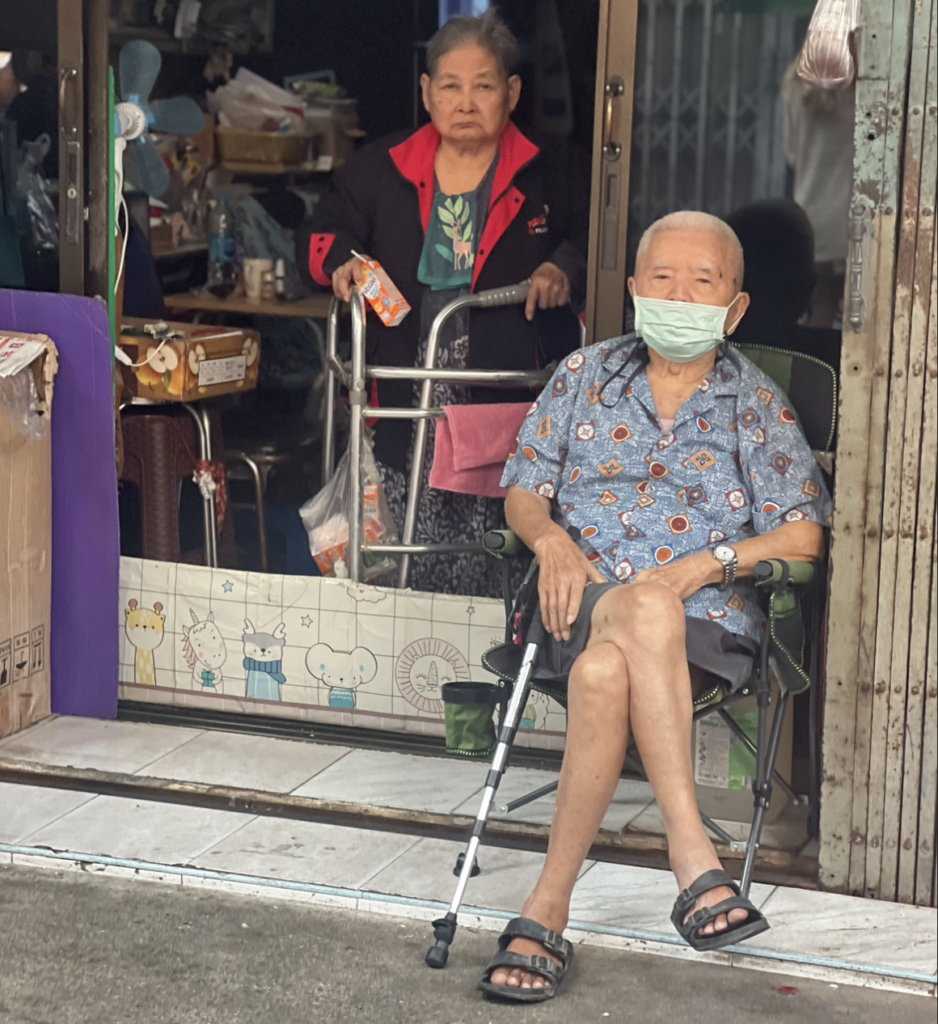
I hate being a tourist. The uneasy stares, the desperate looks, the well-worn paths trodden by countless others before me. I’m staying in some dodgy soi in Sukhumvit, a district that’s exactly as you might imagine—nonstop parties, brash expats, and tired women patrolling the night squares. My mission is to find the real Bangkok, which means venturing beyond these tourist traps. Over the next seven days, I’ll walk, bus, train, and tuk-tuk more than 50 miles in search of the city’s hidden gems.
On my second night, I stumble upon Khlong Toei Market, a wet market in south-central Bangkok. The scene is immense—stingrays, insects, pig snouts, slabs of meat, live fish, and small sharks in open tubs. Rats too. There are rats crawling out from under every stall and into every corner hole. The god-awful smell of death haunts this place. Blood is everywhere. I turn into the alley and a sea of water and blood washes into the streets below my feet. People on top of people. Selling. Buying. Smoking. Reselling. A cacophony of humanity. A place where total mania has replaced rhyme or reason. I last about 30 minutes before retreating to my room, where I drown my jetlag beneath a fresh bottle of Singha.
In the morning, I hail a tuk-tuk. My driver, who struggles to understand English and regards my Apple Maps with confusion, swerves through rush-hour traffic until we reach the west side of the Chao Phraya River. “Two hundred baht,” he shouts, and I hand him the equivalent of $5 USD for the 4-mile journey. Whatever else Thailand is, it is cheap. I visited many temples during my stay, but Wat Arun, the most heavily advertised, is a disappointment. Thousands of Chinese tourists, dressed in Thai garb, swarm the 19th-century spire. The concept of “cultural appropriation” hasn’t reached this part of the world. Overwhelmed, I grab a mango smoothie and escape down the nearest backstreet.
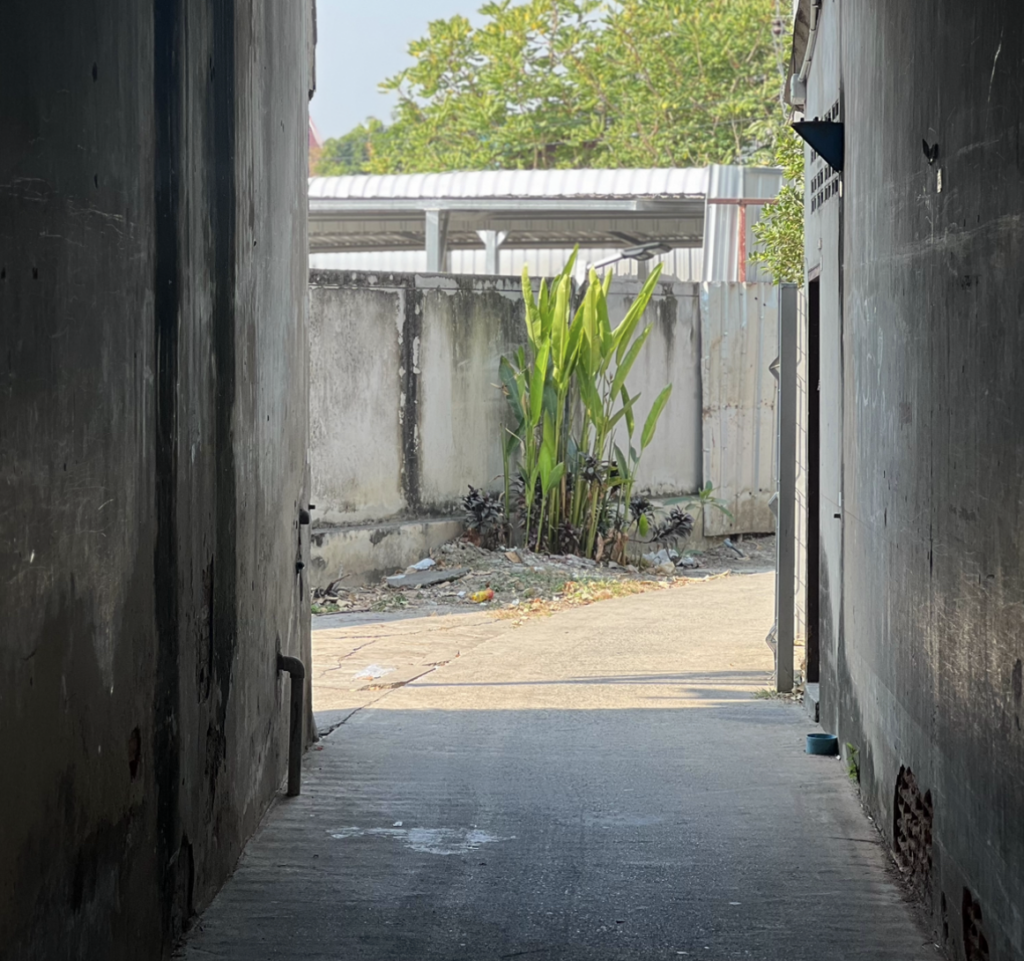
The alleys of Bangkok are its truest beauty—crooked, brittle, and bursting with life. Around every corner, there’s a hidden nook of vibrant greens, blues, and reds, where motorbikes zip past food stalls beneath rundown duplexes. This is the cinematic charm of Bangkok, a world unto itself.
Eventually, I found a temple worth experiencing—Wat Rakang Kositaram Woramahawihan. There are no reviews on Apple Maps, and not a tourist in sight. Inside, a 20-foot golden Buddha sits serenely amidst orchids and hibiscus. A dozen Thais kneel in prayer, their murmurs blending with the scent of sandalwood and lavender. A monk scrolls through his iPhone in the corner. Here, I’ve found a quiet slice in the madhouse that is Bangkok.
I walked alone for a long time on the west side of Bangkok. Construction never stops in this city, there is always something to be repaired or built anew. Hundreds of electrical wires hang precipitously overhead, a disordered harmony that somehow, someway refuses to light the whole city aflame. I do not encounter another white person for hours. It’s the first time in my adult life that I can recall feeling like an absolute minority and one of the first times I can remember walking a city without worry. Never once did I feel unsafe, never once did I feel the urge to reach for my belongings. I wish I could say the same for our Western palaces. In Paris, in Rome, in New York City, and Los Angeles– I never felt completely safe, no matter what cultural or genetic heritages we may share. There won’t be a single day during my three week stay in Thailand and Singapore that I feel concerned about my safety.
At night, Bangkok takes a turn for the Blade Runner. Thick smog hangs heavy in the air, electrifying the polluted sunsets, turning pink and green into wild fluorescents that I’ve only witnessed in the similarly-polluted Los Angeles night sky. Motorbikes erupt like fireflies in every direction as hundreds of thousands of people trample upon the famed night markets. Besides the food, which is brilliant, the quality in these markets is lacking. Knockoff Nikes and sports jerseys are a dime a dozen. The same boring batiks and threadbare Hawaiian shirts hang on every corner. One only needs to visit these markets to understand what real quality costs.
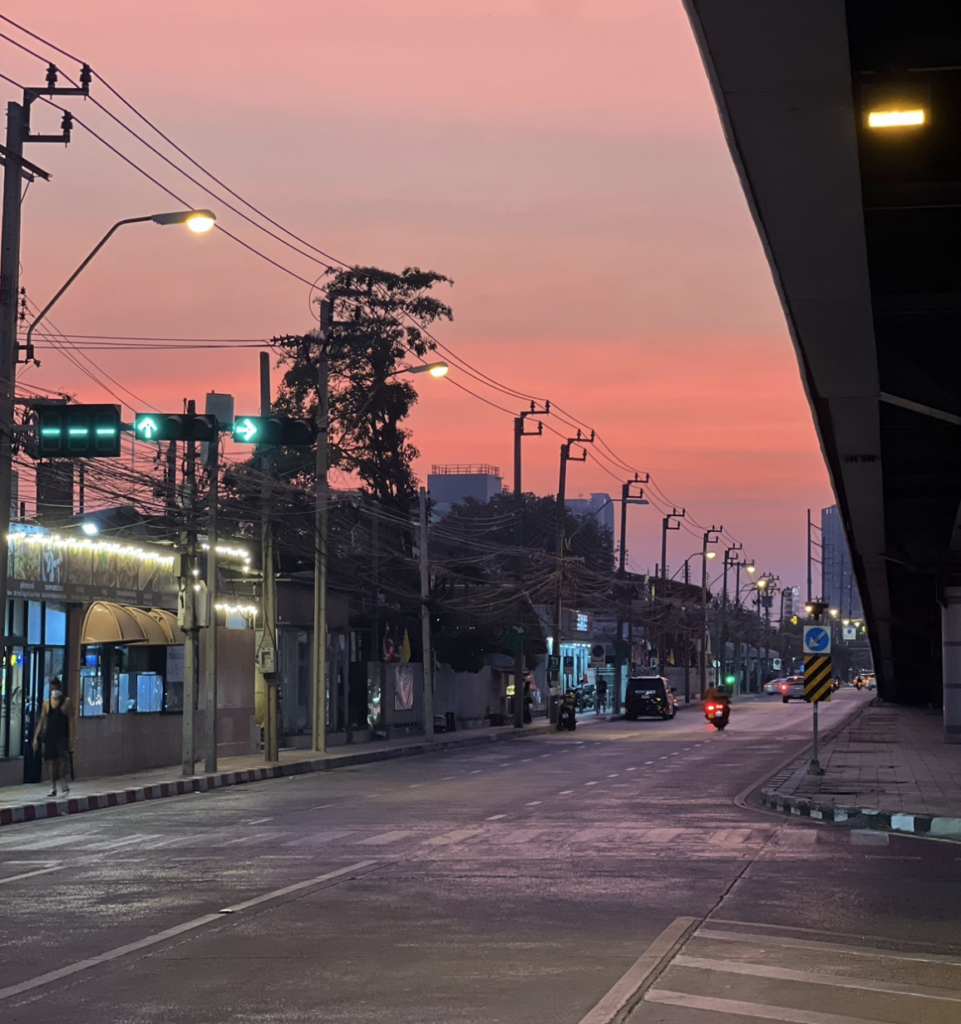
The next morning, I venture to East Bangkok in search of Khao Soi, a Chin Haw dish consisting of hand-sliced egg noodles, chicken, and a curry-soup base that tastes of turmeric and coconut that I first ate during a brief stay in Chiang Mai in the north of Thailand. The neighborhood is alive with the same youthful energy found in Bushwick or Echo Park—chic eateries, Thais in cowboy clothes, and a free-flowing openness that defines the hip enclaves of Ekkamai and Thong Lo. The cigarettes in East Asia are worthless. The Marlboros here are not like the Marlboros in America. I huff down a poorly constructed cowboy killer and chat with some nearby Thais who ask me what America is like. “It’s a mess,” I reply. “But it’s my mess.”
I head south on the back of a motorbike and it’s not not long before the sun sets outside a jazz bar in the hip, historic district of Talad Noi. This is the Bangkok you must find. Skip the night markets and head south of Chinatown to this area bursting with religious shrines, colorful alleyways, trendy cafes, Basquiat-inspired graffiti, and, of course, jazz clubs. I meet up with my sister and her husband inside a bar filled with attractive youths who sip cocktails and chat about Miles Davis. During a smoke break, three Thais in their 20s suggest a spot up the road called TEP Bar that can’t be missed. They aren’t wrong.
The lights are low in the TEP Bar and everyone is clapping in rhythm as we enter. A meditative bliss-out of humming xylophones and regional drums rattle the thin wooden walls inside the bar. The ethereal blues of the far east corridor remind me instantly of Alice Coltrane’s seminal Journey in Satchidananda, in which the Coltrane scion married the cosmic opulence of the old West with the refined elegance of the aristocratic East to create one of the great fusion records of all time. Everyone sings in Thai inside TEP Bar. Everyone. A plate of pappadums is brought table side and our beers are drawn by rope to the second floor by a pulley. The far side of the world. Where I know not a word but hear it all.
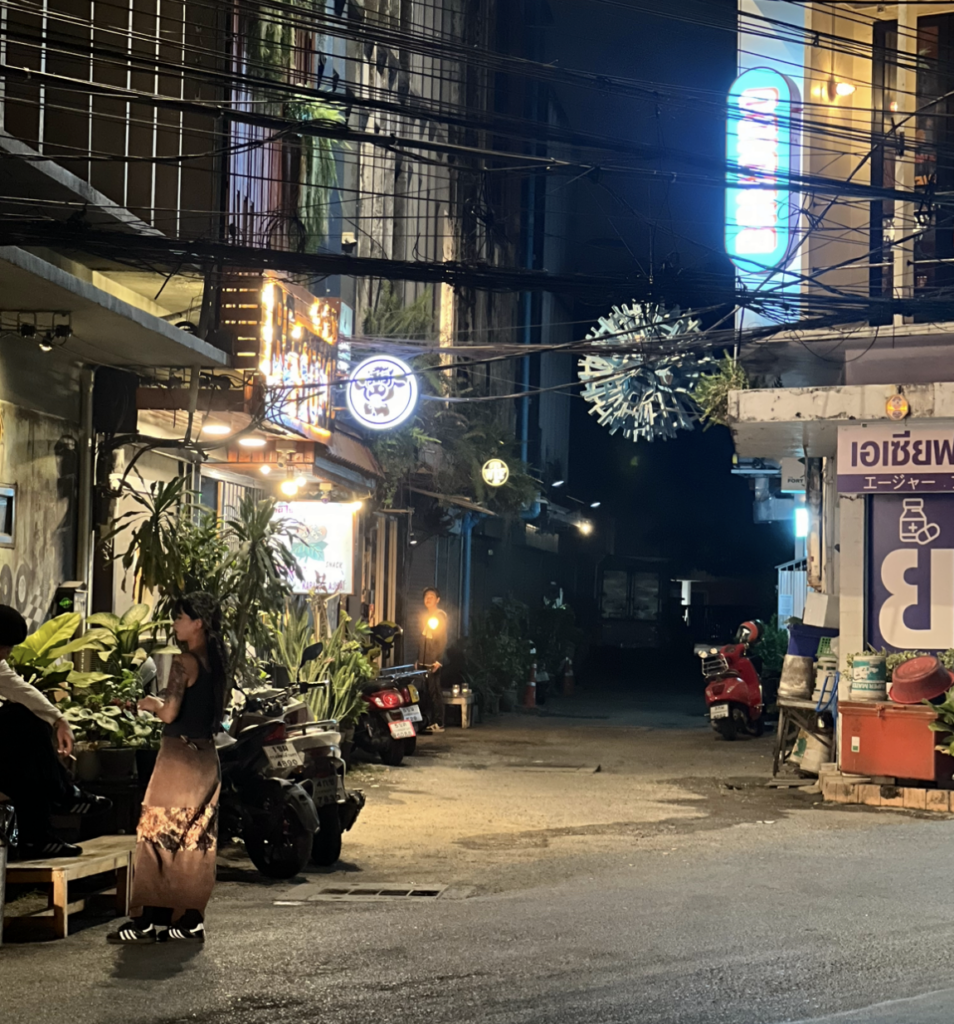
There is a quiet hum hanging outside the streets outside TEP Bar, a rare relief from the nonstop energy that permeates Bangkok. I ask my sister why we didn’t stay in this part of the town. “I didn’t know what you’d like,” she replies—an open admission of our lack of understanding of one another. “But now I know,” she adds with a smile. We hug, something I have worked to get better at with age. The long haul flights, the out-of-body experiences, the people all so different from me. All those miles, all 9,000 of them were worth it for this one moment, where my sister and I finally see each other for real, for the first time. Family means many things but perhaps the greatest part is the learning along the way. About ourselves, about each other. I’d travel to the other side of the world all over again for such a moment and am thankful to have shared it with her then.
There is only one note from my seventh and final night in the Big Mango. “Don’t leave Bangkok,” reads a scribbled, underlined passage in my notepad. Oddly, sitting here stateside in snowy Virginia, I can’t help but miss the madness (and beauty) of Bangkok. Another world in the other world; a place where I met my sister, truly; a place where nothing made sense but life briefly came into focus. But all things must pass. And so, in the morning, with a heart refilled, I leave Bangkok, alive again.
The post The Beauty and Madness of Bangkok appeared first on The American Conservative.
